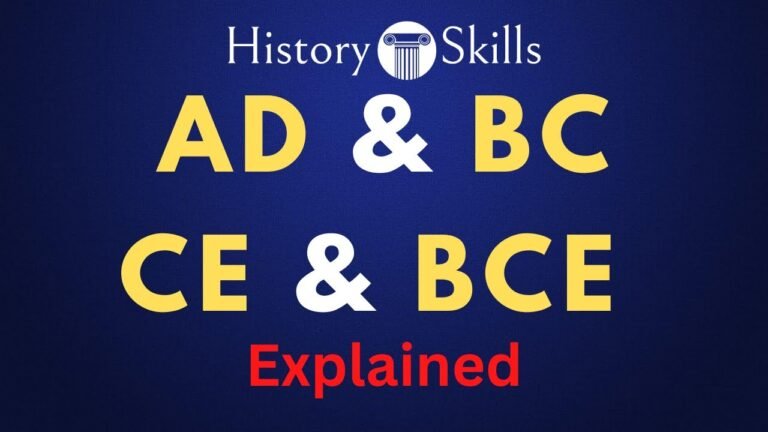Understanding the Significance of BC: A Historical Perspective
In the tapestry of human history, the era known as BC, or Before Christ, marks a pivotal timeframe that laid the foundation for civilizations, cultures, and religions. Spanning from the dawn of recorded history to the birth of Jesus Christ, this period is rich with innovations, conflicts, and transformations that shaped the world as we know it today. Understanding the significance of BC not only illuminates the past but also provides valuable insights into the evolution of societies and their enduring legacies.
What are the meanings of BC and AD?
BC and AD are terms that have shaped our understanding of historical timelines for centuries. BC stands for “before Christ,” indicating the years prior to the traditional birth year of Jesus Christ, while AD stands for Anno Domini, which translates to “the year of the Lord.” This system has been widely used in Western cultures to categorize historical events and periods.
In recent years, however, there has been a shift towards using BCE and CE as more inclusive alternatives. BCE stands for “before the common era,” and CE stands for “common era.” This change reflects a growing recognition of the diverse cultural and religious perspectives that exist around the world, moving away from a strictly Christian-centric framework.
The adoption of BCE and CE allows for a more universal approach to history, making it accessible to people of all backgrounds. By using these terms, historians and educators can foster a more inclusive dialogue about our shared past, emphasizing the importance of understanding history from multiple viewpoints.
Is BC prior to Jesus?
B.C., which stands for “Before Christ,” refers to the years leading up to the birth of Jesus Christ, marking time in reverse from that pivotal event. Interestingly, while Jesus is traditionally considered to have been born in 1 A.D., historical calculations suggest he was actually born in 4 B.C. In contrast, A.D. stands for the Latin phrase “Anno Domini,” meaning “In the year of our Lord,” and is used to denote the years following his birth. This timeline framework has shaped our understanding of history, anchoring it around the life of one of its most influential figures.
In what year did BC begin?
The calendar system we use today, which distinguishes between AD (Anno Domini) and BC (Before Christ), is centered around the traditionally recognized year of Jesus Christ’s birth. This system was developed to provide a clear historical framework, marking the transition from the ancient world into what is considered the beginning of the modern era.
In this timeline, the designation of BC indicates the years leading up to this pivotal moment, with each year counted backward. Notably, there is no year zero in this system; the year immediately following 1 BC is 1 AD. This unique feature can sometimes lead to confusion but is a primordial aspect of how we delineate historical time.
As a result, the BC era effectively begins with the year 1 and continues backwards, encompassing numerous significant events and civilizations that shaped human history. This method of categorizing years not only aids in understanding our past but also provides a structured way to reference events across different cultures and epochs.
Tracing the Roots: BC’s Impact on Modern Civilization
British Columbia’s rich history and diverse cultural landscape have significantly shaped modern civilization. From the early Indigenous communities who cultivated sustainable practices to the waves of settlers who brought new ideas and technologies, BC has been a melting pot of innovation and resilience. The province’s breathtaking natural resources have not only inspired art and literature but have also fueled economic growth and environmental stewardship. Today, BC stands as a testament to the power of collaboration and adaptation, influencing contemporary social movements and environmental policies worldwide. As we trace these roots, we uncover the profound ways in which British Columbia continues to impact our collective future.
A Timeline of Transformation: Key Events Before Christ
The timeline of transformation before Christ is marked by a series of pivotal events that shaped human civilization. The emergence of agriculture around 10,000 BCE laid the foundation for settled communities, leading to the rise of cities and complex societies. The invention of writing in Mesopotamia around 3200 BCE revolutionized communication and record-keeping, enabling the development of laws and trade. The establishment of major empires, such as the Egyptian and Babylonian, further advanced cultural and technological exchanges, while philosophical and spiritual movements, including the teachings of Confucius and Zoroaster, began to influence ethical frameworks. Each of these milestones not only transformed individual societies but also interconnected them, setting the stage for the profound changes that would follow in the centuries to come.
Unraveling the Past: The Legacy of BC in History
The legacy of British Columbia (BC) in history is a tapestry woven with rich cultural narratives, significant events, and diverse influences that have shaped its unique identity. From the ancient traditions of Indigenous peoples, who have inhabited the land for thousands of years, to the arrival of European explorers and settlers in the 18th and 19th centuries, BC’s past is marked by a blend of cooperation and conflict. The discovery of gold, the establishment of the transcontinental railway, and the province’s strategic role in trade and commerce further underscored its importance within Canada and the broader North American context. Today, as BC stands at the intersection of tradition and modernity, it carries forward a legacy that celebrates resilience, innovation, and the ongoing dialogue between its varied cultures and histories.
Lessons from Antiquity: How BC Shaped Our World Today
The legacies of ancient civilizations continue to resonate in our modern world, influencing everything from governance to architecture. The political systems established by the Greeks and Romans laid the foundation for contemporary democracy and civic engagement. Their emphasis on civic responsibility and public discourse not only shaped the political landscape of their time but also left an enduring model that informs the way we approach governance today.
In addition to political structures, the artistic and architectural innovations of antiquity have profoundly impacted our aesthetic sensibilities. The grandeur of Roman engineering, exemplified in iconic structures like the Colosseum and aqueducts, showcases the importance of functionality alongside beauty. These principles are still evident in modern design, where the blend of form and function is paramount, reflecting a deep appreciation for the craftsmanship and ingenuity of our predecessors.
Moreover, the philosophical inquiries of ancient thinkers have paved the way for modern intellectual discourse. The works of philosophers such as Socrates, Plato, and Aristotle continue to challenge and inspire contemporary thought across various disciplines. Their explorations of ethics, knowledge, and existence remain relevant, reminding us that the quest for understanding is a timeless pursuit, one that shapes our values and decision-making processes today. Through these lessons from antiquity, we gain insights that not only honor our history but also guide us as we navigate the complexities of the modern world.
The significance of the BC (Before Christ) era extends far beyond mere dates on a timeline; it marks a foundational period that shaped civilizations, cultures, and belief systems. Understanding this era enriches our perspective on history and highlights the enduring legacies that continue to influence our world today. By exploring the events and achievements of those centuries, we gain valuable insights into the roots of humanity’s journey, reminding us that the past is a vital thread in the fabric of our present and future.






